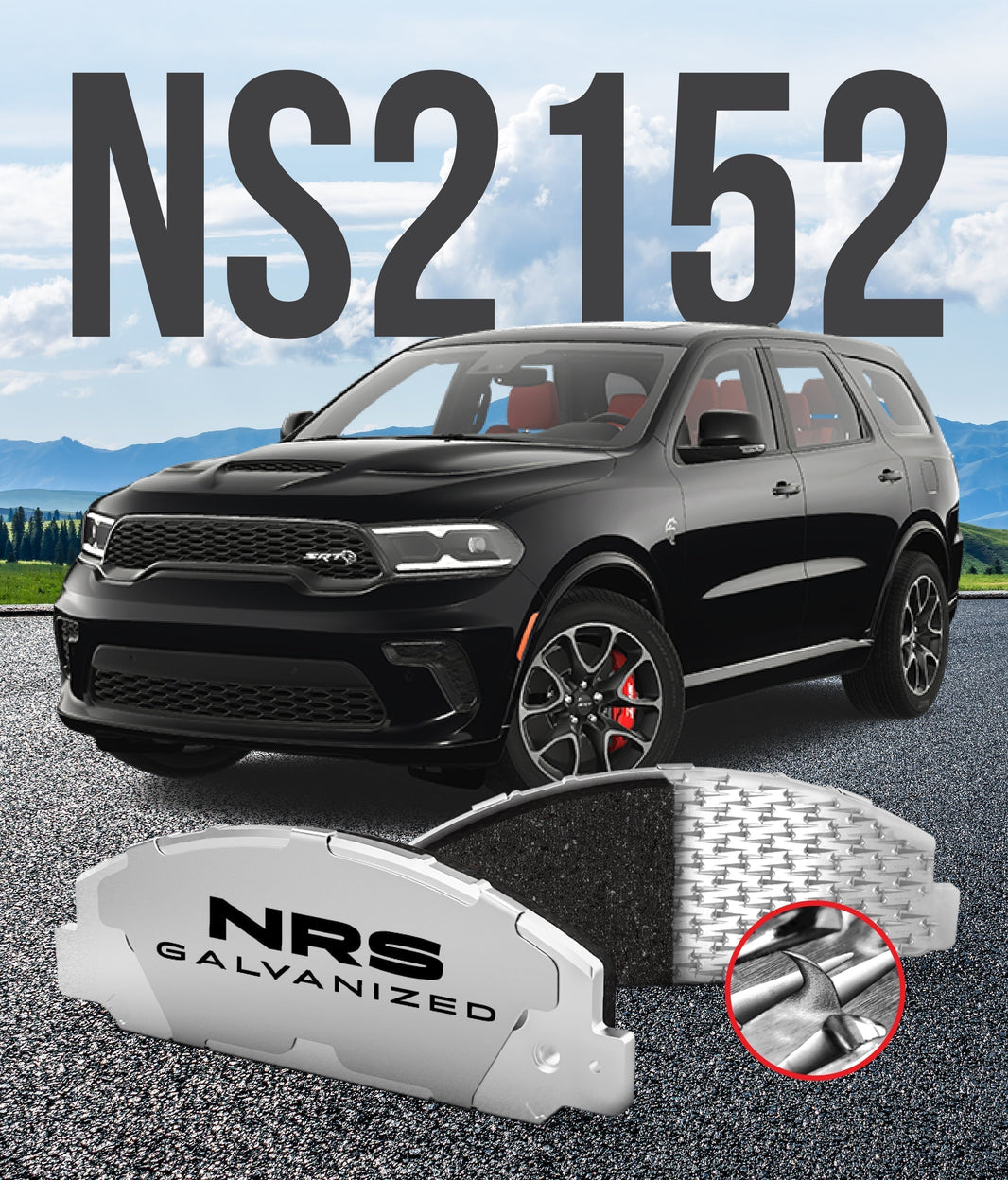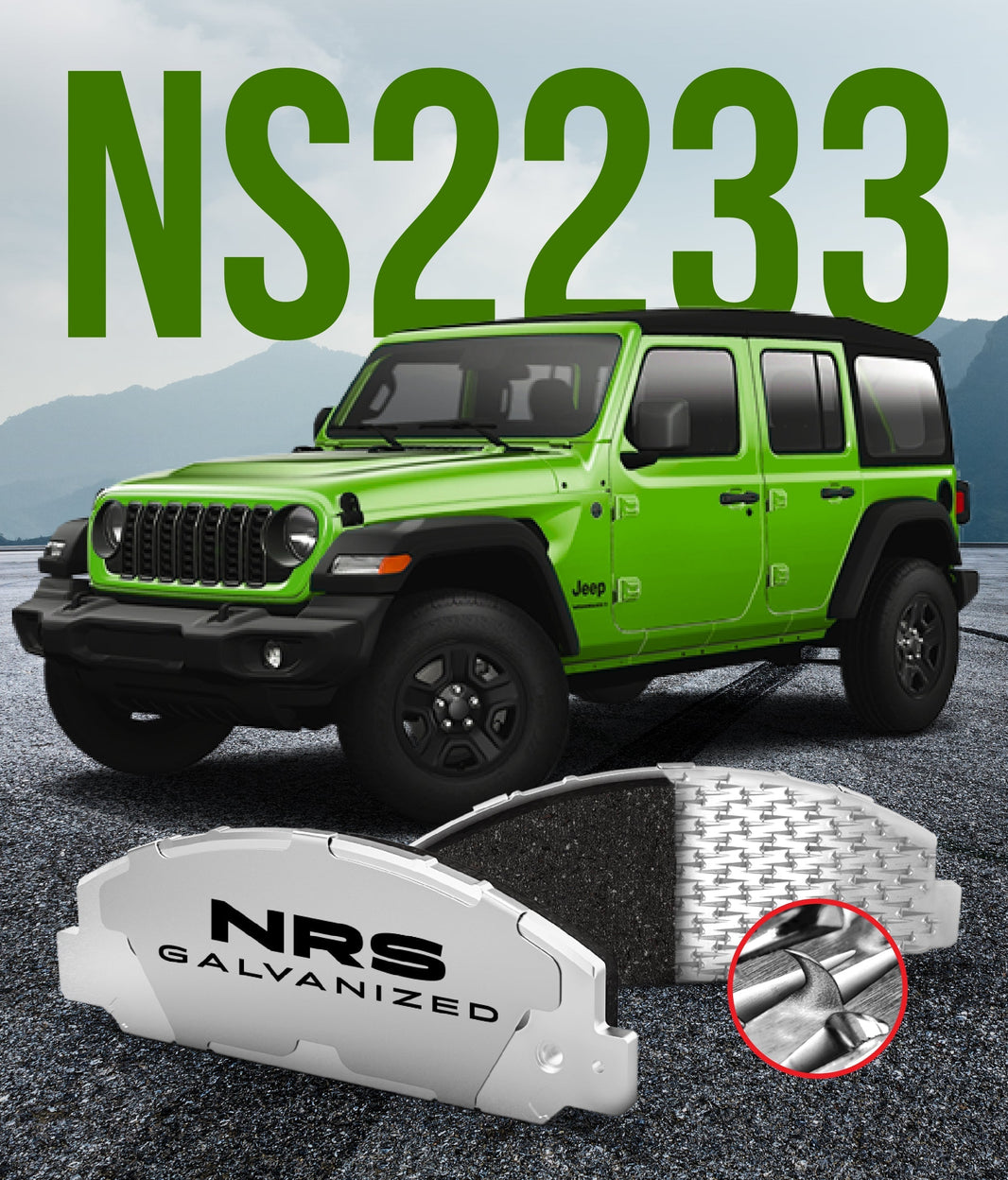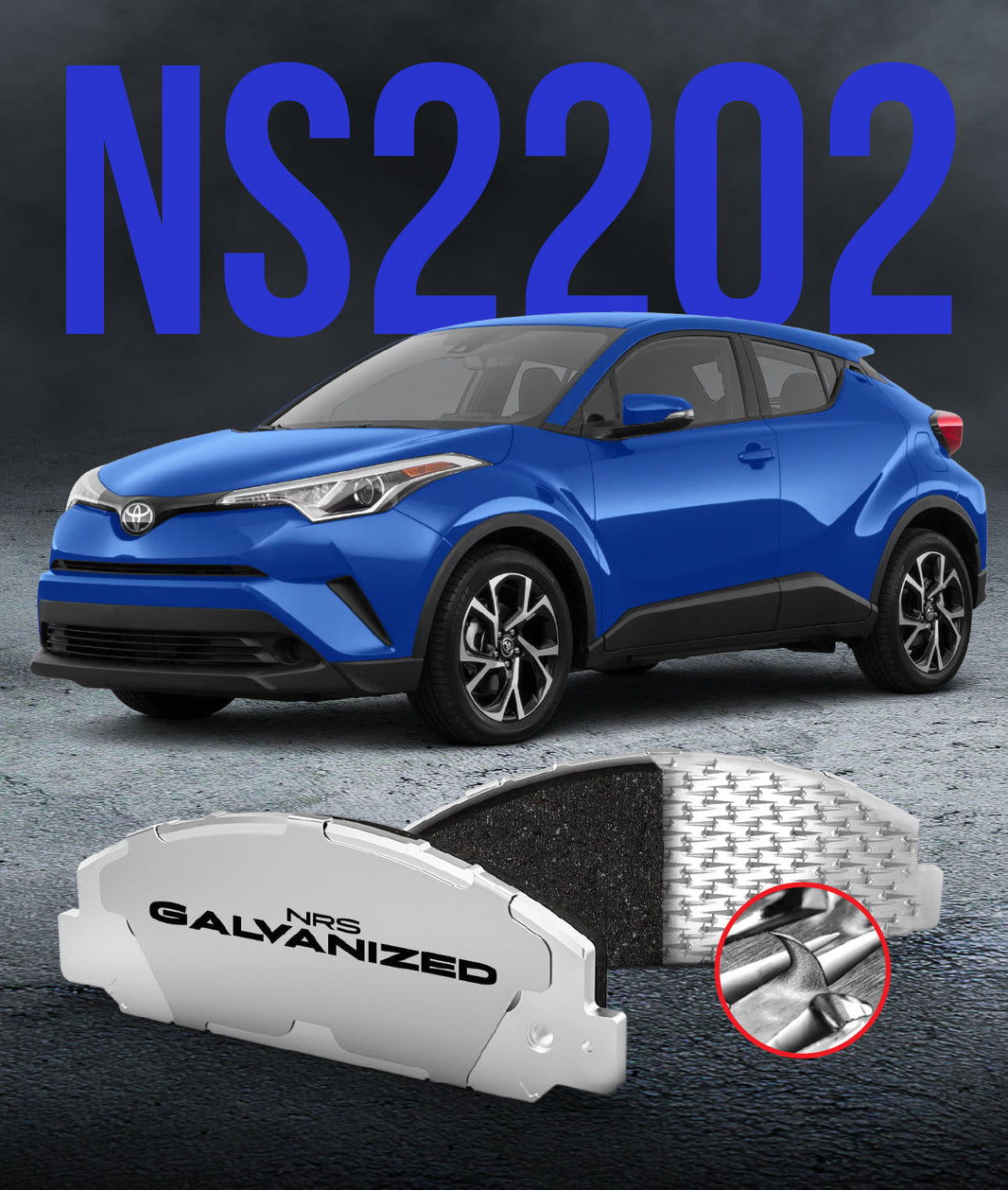
For commercial vehicles and fleet operators, downtime is lost revenue. Every hour a truck or service vehicle spends in the shop for brake-related issues is time it's not generating income. That’s why many fleet managers are turning to NRS Brakes and their galvanized steel backing plates as a long-term solution. Unlike traditional pads that suffer from rust-related failures, NRS Galvanized maintain structural integrity over thousands of miles—even in the harshest environments.
The galvanized backing plate ensures that corrosion won't eat away at the brake pad structure, preventing premature replacements and avoiding costly delamination. Combined with NRS Galvanized mechanical bonding, these pads stay firmly intact over time. For fleets, this translates to fewer brake jobs, longer service intervals, and more time on the road. Investing in brake pads that last longer means lower total cost of ownership, fewer interruptions to service schedules, and extended uptime for your vehicle investment.
Whether you're managing delivery vans, long-haul trucks, or municipal service fleets, choosing NRS Brakes is a smart, scalable solution built for endurance.
The Gauntlet: Unique Challenges for Brakes in Fleet Vehicles
Fleet vehicles – from delivery vans and service trucks to heavy duty transport – operate under a set of conditions that place extreme stress on their braking systems, far exceeding what typical passenger cars endure. These challenges directly impact brake pad wear, performance, and overall lifespan.
Firstly, heavy loads and frequent stops are the norm for many fleet applications. Imagine a courier van navigating city traffic or a Ford F-350 Super Duty work truck hauling equipment to a job site. Each stop requires the brakes to convert immense amounts of kinetic energy into heat, placing enormous thermal and mechanical stress on the pads and rotors. Secondly, high mileage and constant use mean that fleet vehicle brakes are engaged far more frequently than those on privately owned vehicles. A fleet vehicle can accumulate in a few months the mileage a personal car might see in a year, meaning brake components are subjected to relentless wear cycles. Thirdly, harsh operating conditions, including exposure to all types of weather – from slush and road salt in winter to dust and grime in summer – as well as varied and sometimes rough road surfaces, all take their toll. Finally, the cost of downtime is a massive factor for fleets. Every hour a vehicle is in the shop for brake repairs is an hour it's not generating revenue. This makes component reliability and longevity absolutely critical. And above all, the safety imperative for commercial drivers, responsible for large vehicles and often valuable cargo, means brake performance can never be compromised.
Why Traditional Brake Pads Often Buckle Under Fleet Pressure
Given these demanding conditions, traditional aftermarket or even some standard Original Equipment (OE) brake pads often struggle to deliver the required performance and longevity for fleet applications. Their construction typically features inherent weaknesses that are quickly exposed and exacerbated by the rigors of commercial use.
The most common failure point for conventional pads in fleet vehicles is rust and corrosion of the steel backing plate. Standard painted or uncoated plates offer little resistance to the constant bombardment of moisture, salt, and industrial chemicals encountered by fleet vehicles. This corrosion rapidly weakens the backing plate, causes it to swell (leading to binding in the caliper), and critically undermines the adhesive bond holding the friction material. Another significant issue is adhesive failure leading to delamination. The intense heat generated by frequent, heavy braking in fleet vehicles can thermally degrade the adhesives used in traditional pads. Combined with the shear forces from stopping heavy loads and potential rust undercutting the bond, this dramatically increases the risk of the friction material separating from the backing plate – a catastrophic failure that can lead to a complete loss of braking. Furthermore, the friction materials in cheaper pads often wear down very quickly under the constant use and heavy loads typical of fleet operations, necessitating frequent and costly replacements. These shortcomings translate directly into increased operating costs, more vehicle downtime, and unacceptable safety risks for fleet operators.
The NRS Galvanized Solution: Engineered for Commercial Grade Reliability and Longevity
NRS Brakes approaches brake pad design with a clear understanding of these fleet specific challenges. Their goal, "to produce the best brake pads in the aftermarket that fit & function as good as or better than OEM," is particularly pertinent to the commercial sector, where "good enough" simply isn't. NRS Brakes has engineered its products with features that directly counteract the common failure modes seen in fleet use, as evidenced by their focus on Ford Fleet Applications for models like the F-150, Super Duty F-250/F-350, Transit, and E-Series vans – vehicles that are staples in many commercial fleets.
The NRS Galvanized philosophy is built on robust engineering and patented technologies designed for extreme durability. This isn't about minor improvements; it's about a fundamental rethinking of how a brake pad should be constructed to withstand severe service. By focusing on the integrity of the backing plate and the method of friction material attachment, NRS Galvanized creates a pad that can endure the long haul.
Galvanized Steel – The Fleet Operator's Ultimate Defense Against Corrosion
For fleet vehicles operating year round in diverse and often corrosive environments, the backing plate material is critical. NRS Brakes exclusively uses galvanized steel for all its backing plates. Galvanization is the process of coating steel with a protective layer of zinc, a technology with a long, proven history of providing superior corrosion resistance.
This isn't just a thin layer of paint that can easily chip or wear away. The zinc coating prevents rust from forming, even if the surface is scratched. For a fleet of delivery vans constantly exposed to winter road salt or construction site grime, this means the brake pad's structural foundation remains strong and uncompromised throughout its service life. This prevents rust jacking (where the plate swells and seizes in the caliper), ensures the friction material can be worn down safely "to the last millimetre," and dramatically reduces the likelihood of premature pad failure due to backing plate degradation. For a fleet manager, this translates directly to longer service intervals, reduced parts replacement costs, and critically, less vehicle downtime.
NRS Hooks – Unyielding Mechanical Strength for Heavy Duty Stopping
The immense braking forces generated by heavily loaded commercial vehicles put extreme shear stress on the bond between the friction material and its backing plate. This is where traditional adhesive bonds are most likely to fail, leading to dangerous delamination.
NRS Brakes addresses this critical safety concern with its patented NRS Hooks mechanical attachment system. As their materials clearly state, "Instead of adhesives, our brake pads use NRS hooks to secure the friction to the galvanized backing plate." Hundreds of small, sharp hooks are integrally formed into the surface of the galvanized steel plate. During the molding process, the friction material flows around and mechanically interlocks with these hooks, creating an incredibly strong, physical bond that NRS Galvanized guarantees "will never delaminate." This "mechanical retention of the friction material" is unaffected by extreme heat, moisture, or the intense forces experienced during frequent, heavy stops typical of fleet operations. This PACE award winning technology provides an unparalleled safety margin, ensuring the friction material stays securely in place, providing "more secure, safer stops" for the entire life of the pad. This is a non-negotiable feature for commercial vehicle safety.
Premium Friction Formulations and Precision Fit – Consistency for the Long Haul
A rust proof, delamination proof foundation is essential, but it must be paired with high quality friction materials and precise manufacturing to meet the specific needs of fleet vehicles.
NRS Brakes develops and utilizes premium friction formulations designed for the higher operating temperatures and heavier duty cycles common in commercial applications. These materials are selected for their fade resistance, durability under load, and consistent performance across a wide range of temperatures. This ensures reliable stopping power whether the vehicle is making frequent low speed deliveries or sustained highway runs. Furthermore, NRS Galvanized emphasizes OEM Fit Tolerances, ensuring their pads install perfectly ("Fits right out of the box") into the calipers of a wide range of fleet vehicles, including many Ford, GM, Dodge, and import models. Proper fitment is crucial for preventing uneven wear, minimizing noise and vibration (contributing to "Less Vibration, Less Noise"), and maximizing the effective contact area between the pad and rotor. The mention of Z-Numbers in relation to Ford Fleet applications indicates NRS Galvanized alignment with OEM specifications for mechanical retention, a standard their hook technology inherently surpasses.
Proven in the Field: Why Fleet Managers and Commercial Drivers Trust NRS Galvanized
The combination of galvanized steel backing plates, NRS Hooks mechanical attachment, and quality friction materials translates into tangible, bottom line benefits for fleet operators and enhanced safety for commercial drivers.
-
Reduced Vehicle Downtime: The most significant advantage is the extended service life of NRS Brake Pads. By preventing premature failures due to rust and delamination, pads last longer, meaning fewer brake jobs and more time on the road generating revenue.
-
Lower Overall Maintenance Costs: While the initial purchase price of a premium pad like NRS Galvanized might be higher than a basic traditional pad, the reduction in replacement frequency leads to substantially lower costs for both parts and labor over the vehicle's operational life.
-
Enhanced Safety and Reliability: The elimination of delamination risk and the consistent performance of a structurally sound brake pad provide a critical safety margin for commercial drivers who face demanding situations daily. Testimonials citing "Superb performance and reliability" reflect this trust.
-
Improved Driver Satisfaction: Quiet, smooth, and predictable braking contributes to a less fatiguing and more comfortable driving experience, which is important for drivers spending long hours behind the wheel.
The fact that NRS Brakes actively develops and promotes solutions for Ford Fleet Applications and supports a wide array of commercial vehicles underscores their commitment to this demanding sector. The durability and reliability demanded by fleet managers are precisely what NRS Galvanized technology delivers.
We at NRS Brakes understand that for commercial drivers and fleet operators, brake pads are not just components; they are critical assets that directly impact safety, operational efficiency, and profitability. That's why we have engineered our Fleet Brake Pads with robust technologies like galvanized steel backing plates and our patented NRS Hooks mechanical attachment. These innovations are designed to withstand the toughest commercial applications and harshest Canadian conditions, delivering unmatched longevity and preventing catastrophic failures like delamination. We are proud to offer the Best Brake Pads that provide the long haul reliability, reduced downtime, and superior safety that the commercial transport industry demands.




